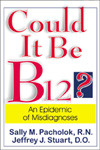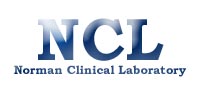|
A prospective clinical study10 was conducted to assess the value of the uMMA
test for the diagnosis of Vitamin B12 deficiency in hospital patients being
evaluated for anemia and neurologic disorders. All subjects (N=27) with uMMA > 20
micrograms per mL were verified B12 deficient by the serum B12 assay, Schilling
test, and blood counts. A second similar study 9 showed all patients (N=27)
with uMMA levels > 14 micrograms per milligram creatinine as being B12 deficient.
Analysis of data from the 54 verified B12 deficient patients showed 20% had
no anemia, 28 % exhibited mental changes, 52% had a neurologic disability at
diagnosis and many had neurologic manifestation attributable to B12 deficiency
years prior to diagnosis.9 In addition, it was stated that "Although a
systematic study has not been made to determine the sensitivity of the uMMA
test, from physician feedback after studying over 1600 patients over a five
year period we have not encountered an untreated pernicious anemia patient,
as identified with a positive Schilling test, with normal uMMA".13 Because
of the high incidence of neurologic disease in non anemic hospital patients
independently living seniors were screened using the uMMA test to detect untreated
B12 deficiency. Although finding 1% B12 deficient was considered significant,
a surprising 7% were confirmed B12 deficient but actually 22% by the current
standard.9,13 See previous discussion of the uMMA test.
Matchar et. al. 17 further defined the uMMA test in a prospective double blinded
clinical study of less obvious B12 deficient hospital patients with uMMA levels
between 5 and 15 micrograms per mg creatinine and determined the uMMA assay
to have a sensitivity and specificity of 100%/99%. Following the above studies,
Lindenbaum et. al. 22 reported a retrospective study using SMMA confirming the
previously reported high prevalence of neurologic disease in non anemic B12
deficient hospital patients.23
The uMMA assay has been validated as a screening test identifying B12 deficiency
in non anemic elderly populations.14 During this work, it was discovered that
the serum B12 test was less sensitive than the uMMA test and was not identifying
B12 deficient individuals with tissue/cellular B12 deficiency. This finding
created considerable interest when presented at a poster session at the 1989
American Society of Hematology convention. The poster handout was subsequently
published in The Vitamin B12 Report.16,45 A vegetarian population without signs
of B12 deficiency was studied using the uMMA test.5 Of individual identified
with cellular B12 deficiency through high uMMA (normal < 4.0) levels, 83%
exhibited a normal serum B12 test. Subsequent treatment with various means of
B12 therapy demonstrated the high accuracy, simplicity and reliability of the
uMMA assay which has not been shown by any other B12 deficiency test to date.
Aspects of measuring of SMMA and Hcys by GC/MS are under patent protection
as noted in reference 53: "The authors and the University of Colorado and
Colombia University hold patents relating to the use of methylmalonic acid,
homocysteine, cystathionine, and methylcitrate in the diagnosis and follow-up
of vitamin B-12 and folate deficiency. A company has been formed at the University
of Colorado to perform the assays."53 There are no patent restrictions
for measurement of uMMA.
NCL established in 1985 was the first commercial laboratory to provide the
uMMA test. NCL introduced the Mayo Clinic to the uMMA assay and Mayo Clinic
has also provided the uMMA test for years. Now other laboratories around the
world are offering the uMMA test which has benefited thousands.
| 
